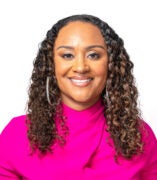
Gholnecsar (Gholdy) E. Muhammad, PhD
John Corbally Professor
Curriculum & Instruction
Contact
Building & Room:
1432 ETMSW
Office Phone:
Email:
About
Dr. Gholdy Muhammad is the John Corbally Endowed Professor of Literacy, Language, and Culture at the University of Illinois at Chicago. She has previously served as a classroom teacher, literacy specialist, school district administrator, curriculum director, and school board president. She studies Black historical excellence in education, intending to reframe curriculum and instruction today. Dr. Muhammad’s scholarship has appeared in leading academic journals and books, including Research in the Teaching of English, Urban Education, Journal of Adolescent and Adult Literacy, Language Arts, and Written Communication. Some of her recognitions include the 2014 recipient of the National Council of Teachers of English, Promising New Researcher Award, the 2016 NCTE Janet Emig Award, the 2017 GSU Urban Education Research Award, the 2018 UIC College of Education Researcher of the Year, the 2020 American Educational Research Association (AERA), Division K Early Career Award and the 2021 NCTE Outstanding Elementary Educator in the English Language Arts. She is the author of the best-selling books, Cultivating Genius and Unearthing Joy. She also co-authored the book, Black Girls’ Literacies published by Routledge. Her Culturally and Historically Responsive Education Model has been adopted across thousands of U.S. schools and districts across Canada. In 2022, 2023, 2024 and 2025, she was named among the top 1% Edu-Scholar Public Influencers due to her impact on policy and practice. She has led a federal grant with the United States Department of Education to study culturally and historically responsive literacy in STEM classrooms.